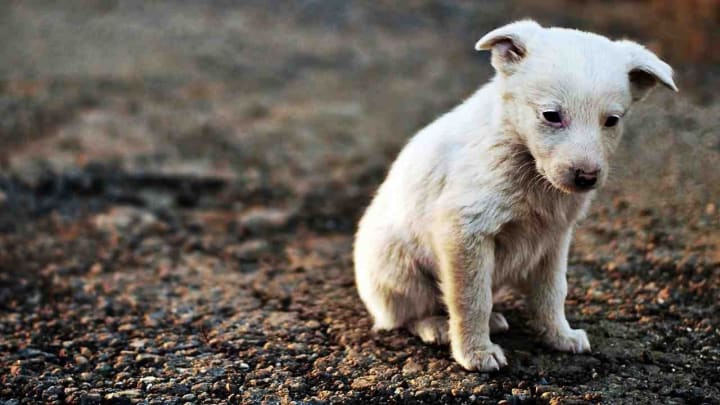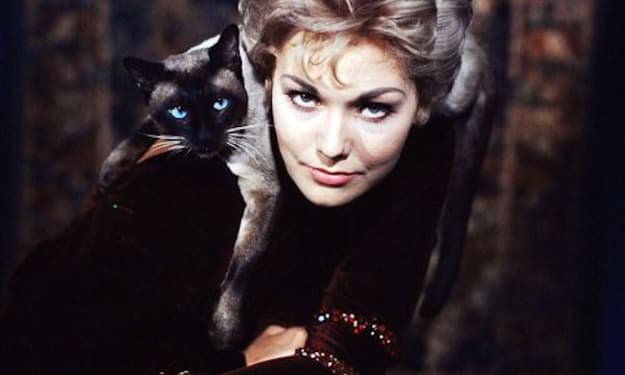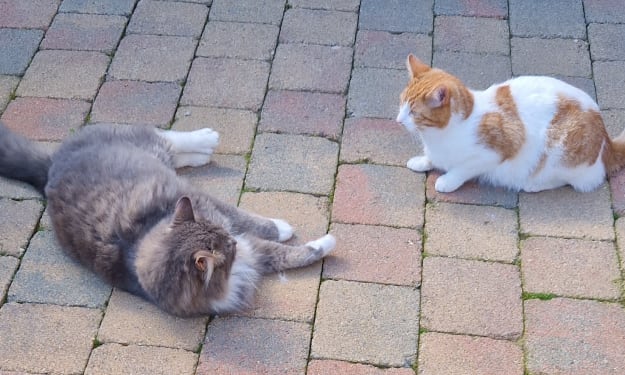Why, On an Abstract Level, I’m Against Pets
Hear me out.

People like to criticize PETA, People for the Ethical Treatment of Animals, because of how many animals they euthanize. These armchair critics would have us believe that PETA euthanizes them because they don’t care about animals.
Now, PETA is far from perfect. They use sexism to sell veganism to people, and do other pretty questionable things. But the fact that they are bombarded with homeless animals is not their fault. Well, whose fault is it?
The answer is simple: the pet industry. Every year, thousands and thousands of animals are bred, raised, and sold into the pet industry, and every year, many of those animals are given up, abandoned, injured, or “run away” and are considered lost.
But what happens to a lost animal? It doesn’t just become a “wild” animal all of a sudden. It suffers out in the open until, nine times out of ten, it either dies or is collected by an animal catcher or private citizen. And many of these animals end up at what are oxymoronically called, “kill shelters.”
Wouldn’t it be great if they could all find new homes? Of course it would. But, for whatever reason — one of which is that an animal becomes far less valuable and appealing and more potentially dangerous after it has become feral — not many people want to adopt lost animals, or older animals. They want puppies and kittens, and nothing less.
So what is the solution?
You might be thinking, “He’s actually saying that killing the animals is the solution! What a monster!”
But you’d be wrong. Killing the animals isn’t the actual solution to the problem. Euthanizing animals is a horrible thing and I want it to stop. But the only way that it will stop is to identify the actual solution: the demand for pets, specifically brand-new pets, must go down.
Once this happens, the supply will also go down; there will be no more massive surplus of unwanted or lost animals. There will be fewer animals clogging shelters, and by extension, fewer euthanasias.
Let’s think more deeply about the ethics of pets. What are the good things about pet ownership? Ideally, the animal is given a safe and loving home where all of his or her physical and emotional needs are taken care of. There is little to no chance of death by starvation or violence from a predator when a pet has a loving home.
Pets provide people with meaningful connections. If you’re a person with “a lot of love to give,” a dog or a cat can act as an important outlet for that love, and the animal is able to reciprocate.
Let’s also discuss the rather darker realities of pet ownership. Putting aside the worst case scenarios, where the animal is mistreated or abandoned, pet ownership, by definition, means one or two things almost without exception. For one, families of animals are broken up at birth.
Second, breeding produces traits in certain breeds that can make the animal’s life more difficult; for example, the knee pain experienced by thoroughbred Alsatians, or breathing difficulties in pugs.
Third, when you think about it, spaying and neutering — while a necessary measure from nearly any perspective you can take — is an odd and inhumane practice. It is done for two main purposes: to keep the animal from breeding, and to make the animal more temperate in terms of its mood. Both of these purposes are beneficial to the animal’s owner, in large part.
One could argue that certain female animals live longer if they are never allowed to become pregnant. On one level, yes, this does benefit the animal. But on another level, it benefits the animal’s owner. So it is mutually beneficial. All right. But does it matter that it’s the human’s choice, not the animal’s? Does it matter that the animal is not free, in any sense, to make such a choice?
Now I’m going to make an analogy that some people might call irresponsible. Pets are subjected to a sweet, wonderful, carefree life where all of his or her needs are taken care of. Ideally, there is no fear of premature death, unwanted pregnancy, or nearly any other pratfall. But is this any kind of condition that a human being would accept if it were imposed on him or herself?
“You may only eat one food for the rest of your life.”
“You may not leave these premises.”
“You may not experience sexual relations with others of your kind.”
“You will never meet your mother or father.”
“You can only interact with me, your master, when it is convenient for me.”
“If you become too old, grizzled, needy, or intemperate, you may be killed.”
The go-to response to this argument is, “Well, a human is a human, and a dog is just an animal.”
I wouldn’t argue that animals and humans are exactly the same, or even that they have the exact same value. But imagine if there was a race of beings from another planet, or another dimension, who tried to enslave us humans, and based their rationale on a statement like, “well, we are Treblassians, and a human is just a human.”
Would that argument be acceptable then? No, of course not. So why is it acceptable when it comes to animals?
The funny thing is, you don’t need to “imagine” a race of beings who espoused this belief because white nationalists have actually made the same argument when it comes to people of other races as a justification for dehumanizing and, in many cases, enslaving or exterminating them.
“Well, we are white men, and they are just blacks/savages/women/gays.” The decency and quality of their lives is no longer a given, no longer entitled to them if it ever was.
But you will say, “We don’t want to enslave or exterminate pets. We want to love them.”
Keeping in mind the title of this article, which specifically says “On an Abstract Level,” I will grant that, on a concrete, realistic, practical level — i.e. in the real world — there are many, many animals that need love. I’m pretty sure that being a pet is generally far better than being a stray, being imprisoned in a kennel or other shelter, or being killed by predators or run over by cars. One thing every animal definitely knows — as does all life, in my opinion — is that it doesn’t want to die. Being a pet is a great way to not die.
If you want to love animals, that is great. If you want to take them from a miserable life in a 3’x3’ box or a scary back-alley, care for them, socialize them, feed them, take them to the vet, take them for walks if necessary, maybe allow them to meet others of their kind, and encourage them to have some semblance of an actual life, I think that’s great.
If, however, your life is in desperate need of love, of reinforcement, of acceptance, of companionship, of amusement, and you feel an animal is the best or only way to fulfill those needs, consider briefly if getting a pet is the right way forward. Maybe you really do love animals. Consider exercising and strengthening that love by going vegan, volunteering at an animal sanctuary, giving to causes and advocating for legislation that pertains to animal well-being, or being around someone else’s pet first.
Connect with other people who love animals and learn how being an “animal-lover” affects you, what it feels like, and how it can affect you as a person. And then, when you’re ready, don’t go to a pet store or a puppy mill. Adopt an animal from a shelter.
I understand that human beings can be a drag and animals are a relief. They seem to always be there, to need love, to accept us for us, despite how we look, feel, or the state of our lives. They are lovably ignorant and oblivious. I get that. But people who have given up on humans, or on life or on the world, have a fickle tendency. Their loves often don’t last, including their self-love. And humans need love too.
So if you have given up on humans, or on yourself, and you only get this pet so that it can prop you up, so it can give you love when you need it —when it is convenient for you — and then, one day, your love runs out, gets lazy, becomes unmerciful, intolerant, or unforgiving, or just goes missing, that animal could end up going out the door, one way or another, and on the receiving end of a needle. And then PETA will be there for you to blame, representing the evil world that you’ve given up on, the realities that you helped to create, and that you did nothing to change.

About the Creator
Aulos.Media
I'm working on my webnovel, "Binary Shadows: The Prize of the Cybernaughts." I have 47,000 words so far. Once I reach 100,000, I'll start posting it on Royal Road.
I like....lots of things.
IG and TW: @aulos.media






Comments
There are no comments for this story
Be the first to respond and start the conversation.